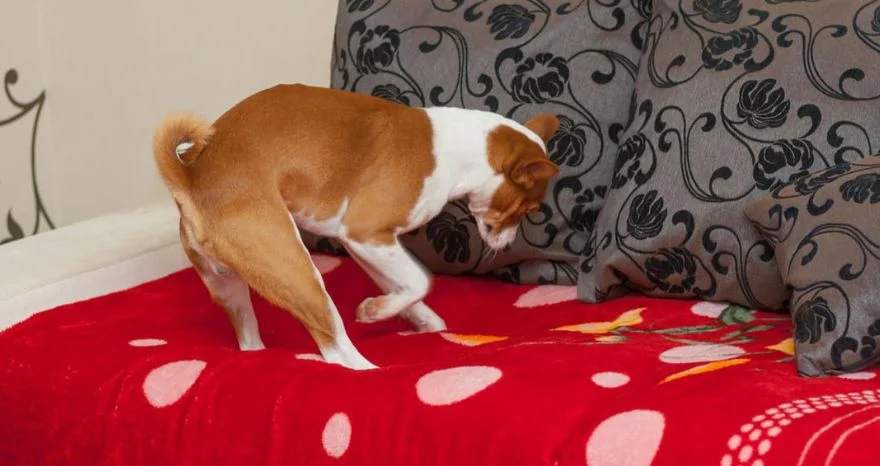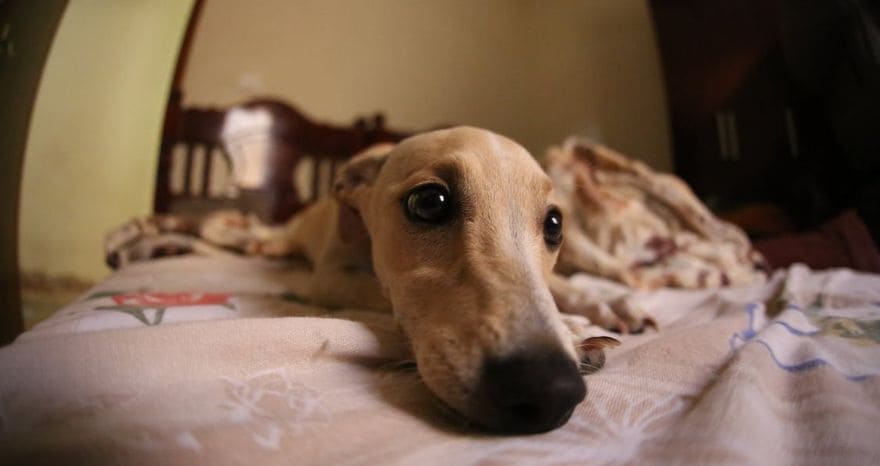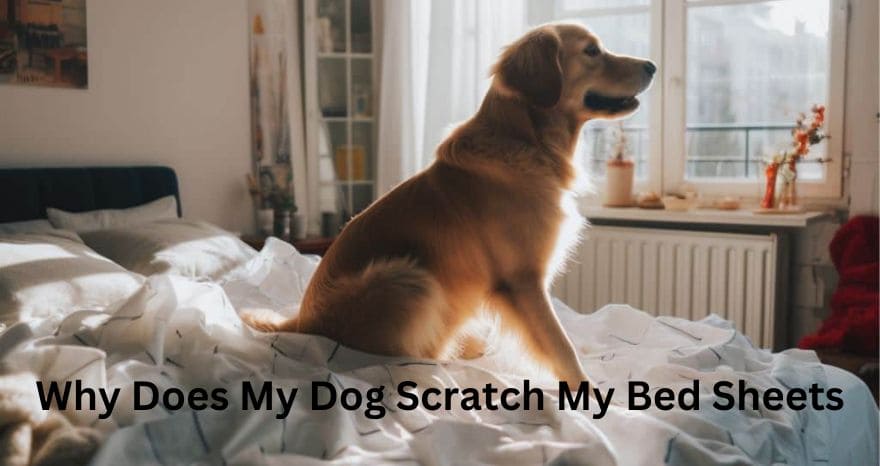Why does my dog scratch my bed sheets? It can be a significant problem for many dog owners.
You may be surprised to see your dog dig, scratch, or paw your bed most of the time. Whether it is a three-month-old pup or an adult dog, you’ve probably noticed this behavior so many times. You will definitely want to finish it as this can cause permanent damage to the furniture and bedding. And in this article, I will explain why my dog scratches my bedsheets.
However, scratching your bed can be provincial behavior. Dogs naturally force to mark their area. Also, there are glands in a dog’s paw that devise a distinct odor on dog beds or other objects every time they scratch. You can only see the torn blanket, but your canine can detect and smell the space it created himself.
So, read till the end to find out other reasons and ways to stop it!
What is mean when my dog scratches my bedsheet?
Why does my dog keep tearing up bed sheets? The question to ask yourself is how often your dog exhibits this behavior. Usually, dogs do a lot of weird things to us. Equally, we need expert explanations to understand why they behave this way because we can’t communicate.
You can characterize scratching near the bed by kicks, scrapes, and rolling where your dog plans to rest. Many dogs turn around several times before sitting down. Some hide under the covers to make a cave or tunnel where they can conceal.
Canines frequently see the hill of surfaces as a jungle gym. However, they will likewise scratch the resting region in any event when there is no bed. For example, if your canine decides to lay down with cold burners, he may strike and nibble the floor around him. Any surface you choose to rest on is fair play.
Usually, dogs of all ages, breeds, sizes, descents, and origins exhibit this behavior. It can start primal in life or manifest itself in old age. You don’t have to stress that your canine has a psychological issue or that you successfully cause the problem.
Canine proprietors everywhere in the world deal with a similar issue. It takes a little understanding and patience to keep your dog comfortable and a bed that doesn’t turn into confetti in a week.
Reasons why does my dog scratch my bedsheets
Why do dogs scratch their beds all the time? This can be a burning question on your head!
Watching our dogs rummage through the sheets can be fun at times, but it can also be frustrating significantly if they interrupt sleep patterns or damage the sheets. Before giving some tips on reducing the behavior, it might be worth understanding why dogs dig sheets first.

Several factors are responsible for the scratching of the bedside table. We can attribute your dog’s behavior to one or more of the following factors.
Maternal Behavior
When your dog is expecting toddlers, her instinct is protective, and she probably starts preparing the environment to keep her kids comfortable. Her hormones can push her to do this and be more protective so that babies feel comfortable and safe when they enter this world.
Natural Instinct
Scratching your bed is an inherent aptitude. Your canine’s wild precursors crossed at heaps of leaves, soil, and pine needles to make a pleasant hill. In the wild canine world, burrowing and cycling have changed sticks, shakes, and grass into more agreeable or uniform spots.
The home additionally filled in as an assurance from hunters. By controlling the materials around them, they can conceal their position and feel less helpless.
Furthermore, burrowing under leaves and soil can make a hotter or cooler spot where canines can stay away from harsh climate and excessive temperatures. Numerous homegrown creatures hold their tunneling conduct. This is the reason your puppy is building a post out of his covers.
Learned Behavior
This can be a self-learned activity, as canines see each other and exchange experiences. When a dog sees another dog scratching the sheets, he can learn the behavior and do it himself. So, if a new dog recently joined your team and crossed the bed, your other dogs may get self-involved!
Regional Conduct
Once more, scratching your bed can be regional conduct. Canines are nature-compelled to stamp their region. You most likely realize that canines pee on objects as their own, yet this irritating conduct isn’t the best way to take care of business.
Puppies have organs in their legs that leave a particular scent on the bed or different articles each time they tingle. You can see the torn cover, yet your canine can see and smell the space he has made for himself.
Canines are bound to get back to bed on the off chance that they, as of now, feel like they are. This might be the explanation that side-scratching conduct here and there starts or strengthens. Once more, when other pet or individual moves into the home or other critical changes are made to the house, this can occur.
Why Does My Dog Dig The Bed?
Digging, like scratching, is another sleeping habit that every dog owner observed usually. Some owners hate this habit as they frequently search on the internet “stop dog digging bed”! (through recent research). Astonishingly, excavation to his bed, also called hiding, is more intuitive than bad behavior.
No matter how growling and croaking amateur gardeners among us, the dog, for apparent reasons, digs in the yard. After all, the ground is flexible, and the dog can dig until it is saturated.
Dogs can tell the outdoor sex from the sex of their favorite duck, bed, or cage. The material composition of a dog has fewer consequences than action.
When it comes to sleep, falling asleep can be habitual, automatic, or temperature-related. In nature, burrowing beds fill in as a technique for controlling excessive temperatures.
Since canines have restricted perspiration organs, canines can excavate homes when sun-consumed outside, uncovering the more significant part of their bodies to the virus earth. In chilly climates, it assists with concentrating accessible body heat, catching me in an improvised opening.

Living in the wild, the canine intuitively attempts to cover up in agreeable, shielded spots while resting. They can burrow an opening to make a spot to stow away from hunters and stay warm and dry in the colder time of year.
Surprisingly, they do this more excellently in the late spring. Again, at the point when your canine lives inside, this nature is still there and can make him tunnel into your covers or bed to make this shielded space.
How to prevent my dog from scratching their beds
While your dog’s habit of digging can be enjoyable, it can sometimes be highly destructive. For example, your new pet bed can quickly turn into a pile of padding and fabric if you’re not careful. Likewise, scratching a dog can quickly turn into a pet owner’s nightmare, even if the dog lover is on your Instagram resume.
The good news is that there are some steps you can take to prevent your dog from scratching the bed.
You can invest in a greener bed.
Sometimes the problem is not with your dog but with the bed you are using. Unfortunately, some company designed a cheap fabric and upholstery bed which is also responsible for the dog digging and scratching every night.
This is why it is so essential to purchase a bed with a durable cover. Also, a comfortable bed can limit the amount of digging that needs to be satisfied. In this case, it may be a good idea to purchase an orthopedic bed or memory foam for you and your dog.
Give other ways to play.
If brushing your dog’s bed has become more of a toy than a relaxing nighttime ritual, your dog may not have enough arousal. Try taking them on longer walks or giving them toys to keep them busy.
Cut down your dog’s nails.
Your puppy will always benefit from a good manicure – cutting his nails regularly will help minimize the damage you can do to his sleeping area. Dogs should trim their nails every 3-4 weeks. Regular watering can prevent possible damage to furniture or hardwood floors and avoid nail contamination.
If your dog’s nails are still sharp after clipping, it may be helpful to file them down to prevent the tips from growing smoothly.
FAQ:
Why do dogs scratch blankets before lying down?
You will find olfactory glands in your dog’s paw. And it’s really a surprising feature. When your dogs go to bed, their paws assist two purposes. By scratching and walking around their beds before lying, our dogs can ward off unwanted parasites and mark the territory with their distinct scent. And that’s why they often scratch the blanket before lying down.
Why do dogs scratch at pillows?
The primary root causes that a dog fluff a pillow or bed comes from its ancestral behavior. There are many reasons for these instincts of the wolf and wild dogs. First, because wild dogs dig their den just in case, this behavior depends on the fact that they feel safe. Another reason is that the instincts direct them to hide the bed from predators. It may sound vague, but this habit makes them feel safe while sleeping.
Why is my dog biting my bed sheets?
For most canines, chewing can be a natural, healthy behavior limited to their treats and toys. In the interests of your pet’s happiness and health, it is crucial to combat chewing in bed immediately. You may bring your dog into a bed to provide a comfortable resting place, not a chewy toy that could ruin it. Adult dogs mostly chew on the bed to relieve stress or reduce boredom.
Why does my dog pull my blankets off of me?
By moving the blankets, your puppy may try to create a comfortable nest to sleep in. Another behavior that you may have noticed in your puppy is that it acts territorially. By scraping and moving the blankets, your dog can mark its territory.
Conclusion:
If you were wondering, “Why does my dog scratch my bed sheets” We hope you find this information helpful for better understanding.
It’s not such a big habit. It would help if you did everything you can to get your dog to overcome this unhealthy behavior. It can make him more aggressive towards you (as in territorial aggression or domination) if you don’t.
It won’t be too difficult for you to help your dog get rid of this behavior. Follow some of the procedures listed above.
Also, remember that if the behavior is particularly destructive or aggravating, it may be wise to seek advice from your veterinarian.

